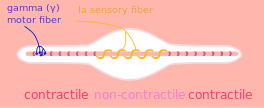Type Ia sensory fiber

A type Ia sensory fiber, or a primary afferent fiber is a type of sensory nerve.[1] It is a component of a muscle fiber's muscle spindle, which constantly monitors how fast a muscle stretch changes. (In other words, it monitors the velocity of the stretch).
Function of muscle spindles
For the body to keep moving properly and with finesse, the nervous system has to have a constant input of sensory data coming from areas such as the muscles and joints. In order to receive a continuous stream of sensory data, the body has developed special sensory receptors called proprioceptors. Muscle spindles are a type of proprioceptor, and they are found inside the muscle itself. They lie parallel with the contractile fibers. This gives them the ability to monitor muscle length with precision.
Types of sensory fibers
This change in length of the spindle is transduced (transformed into electric membrane potentials) by two types of sensory afferents, whose cell bodies are located in dorsal root ganglia located next to the spinal cord.
The two kinds of sensory fibers are different in respect to the kind of potentials they generate:
| Type | Primary/secondary | Response |
| Type Ia | primary | Respond to the rate of change in muscle length, as well to change in velocity, rapidly adapting |
| Type Ib | N/A | in Golgi tendon organ |
| Type II | secondary | provide position sense of a still muscle, fire when muscle is static [2] |
The first of the two main groups of stretch receptors wrapping the intrafusal fibers are the Ia fiber, which are the largest and fastest fibers, and they fire when the muscle is stretching. They are characterized by their rapid adaptation, because as soon as the muscle stops changing length, the Ia stop firing and adapt to the new length. Ia fibers essentially supply proprioceptive information about the rate of change of its respective muscle: the derivative of the muscle's length (or position).
Type Ia fibers connect to both nuclear bag fibers and nuclear chain fibers. These connections are also called "annulospiral endings".
Efferent innervation
In addition, the spindle also has a motor efferent innervation carried by gamma motor neurons, which is used by the nervous system to modify the spindle's sensitivity.
Termination of afferents
Ia afferents from the muscle spindle terminate on the proximal dendrites of motor neurons.
See also
- Intrafusal muscle fiber
- Type II sensory fiber
- Gamma motor neuron
- Beta motor neuron
- Proprioception
- Motor system
- Muscle
- Muscle spindle
- Reflex action
References
- ↑ Boyd, I. A. (1980). "The isolated mammalian muscle spindle". Trends in Neurosciences. 3 (11): 258–277. doi:10.1016/0166-2236(80)90096-X.
- ↑ Michael-Titus, Adina T (2007). Nervous System: Systems of the Body Series. Churchill Livingstone. ISBN 9780443071799.
External links
- Lecture notes from John D.C. Lambert on neurophysiology.
- http://highered.mcgraw-hill.com/sites/0070272468/student_view0/chapter9/chapter_overview.html